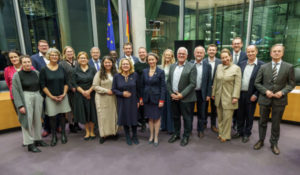What is the role of independent science and policy advice in a time characterised by climate change, polarisation and autocratisation worldwide? How must science itself, and as part of it the field of development research, reform itself in order to live transregional and reciprocal knowledge cooperation as instruments of transformative change for a sustainable future?

These and other questions were discussed at the anniversary event hosted by the IDOS together with the Committee on Economic Cooperation and Development (AwZ) on 14 March at the Bundestag, marking the start of our anniversary year. During this anniversary year, IDOS does not only want look back at the past 60 years of research, policy advice and training for development policy and cooperation, but also to discuss with national and international partners the institute’s role in the future. How can IDOS continue to contribute to constructively and cooperatively shape an increasingly multipolar world through research, the promotion of young researchers and practitioners, policy advice and transregional knowledge cooperation against the backdrop of advancing climate change and species extinction, social polarisation and political autocratisation, demographic redistribution and geopolitical tensions?
Based on this, the anniversary event on 14 March focused on the contribution of development research to shaping German development policy. The event began with a welcome address by Dr Christoph Hoffmann, Member of the German Bundestag (MP) and Acting Chairman of the AwZ, who emphasised the importance of scientific foundations at a time when the policy field of international development cooperation is under particular pressure. In her subsequent welcome address, Prof Dr Anna-Katharina Hornidge emphasised IDOS‘ contribution to the development of transformation pathways for Sustainable Futures – Futures in the plural, as IDOS recognises that there are – within the planetary ecological, as well as economic, social and political boundaries – different ideas and designs of Sustainable Futures worldwide. In her keynote speech, Federal Minister Svenja Schulze (BMZ) emphasised the changing geopolitical context in which trust in multilateralism is increasingly weakened. Against this backdrop, the evidence that flows into policy advice as a result of IDOS‘ empirically based and application-orientated research is of central importance. By doing so, IDOS provides support in crises, helps to take a closer look, listen and understand the complexity and multi-layered nature of political events.
Following the welcome remarks and keynote address, Federal Minister Schulze, Member of Parliament Volkmar Klein (CDU/CSU), Member of Parliament Ottmar von Holtz (Bündnis 90/ Die Grünen), Prof Ursula Schröder (IFSH) and Dr Sebastian Haug (IDOS) reflected in a panel discussion moderated by Dr Julia Leininger (IDOS) on IDOS‘ role in shaping German development policy. While Federal Minister Schulze pointed out how empirically based findings and recommendations from academia informed, for example, the decision to adopt a feminist development policy, Volkmar Klein emphasised the importance of IDOS‘ research work for analysing interdependencies between different areas of development policy. Against the backdrop of a changing geopolitical context, Sebastian Haug spoke about the expansion and rethinking of partnership structures that are still too often based on old „donor-recipient structures“ in the field of development cooperation. Ottmar von Holtz also pointed out that the new self-confidence of countries in the so-called Global South poses new challenges for German development policy, for example in cooperation with countries that have fundamentally different values. In response to Julia Leininger’s question about bridges between security and development policy, Ursula Schröder emphasised the contribution of development policy to security: “Especially in times when we are dealing with problems that not only cross borders, but are global and can take on planetary dimensions, we need policies that are geared towards global cooperation and have a global common good policy in mind. These are issues that are at the core of development policy and lie at the heart of IDOS‘ work.“
The reflections on the future of international development research and cooperation initiated at the event will be continued in the course of the anniversary year 2024 at further anniversary events in Brussels and Bonn with a different focus and in different constellations.
Pictures of the event can be found on Flickr (#60YearsIDOS | Flickr).
Interviews on the 60th anniversary of IDOS (German only)
A longer YouTube video impression of the anniversary event „60 years of IDOS“ can be found here.

Schreibe einen Kommentar